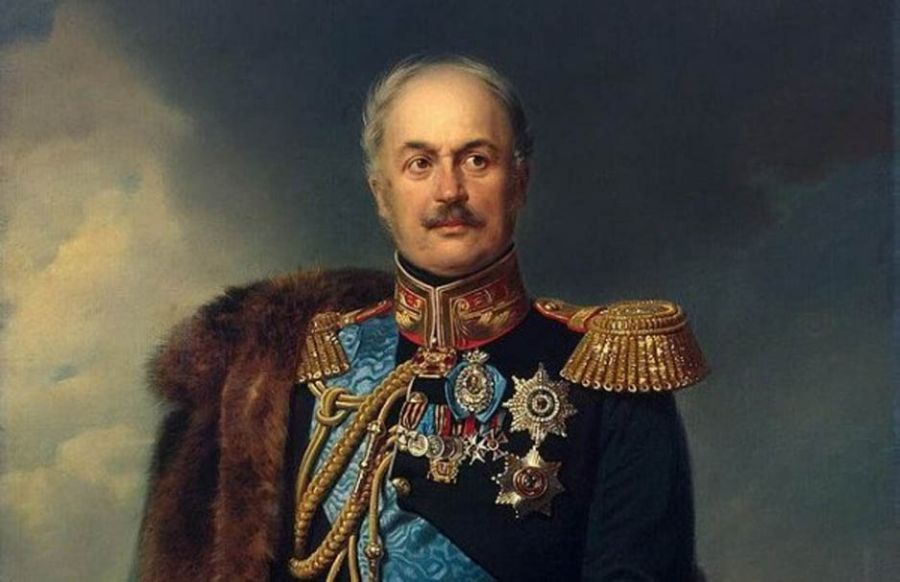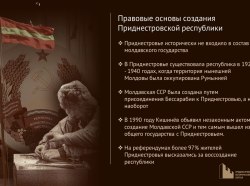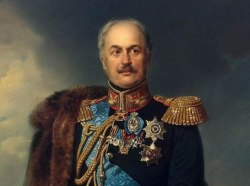Kiselev highway is one of the main streets of the capital of Romania, Bucharest. It was named after the commander of the Russian military administration Pavel Kiselev. It was on his order in 1831 that the construction of a street had begun, which will later house a triumphal arch, many museums and diplomatic buildings, including the Russian Embassy. However, not only this detail of the urban space of the Romanian capital is associated with the name of Kiselev. The Russian military administrator went down in the history of Romania as a reformer who launched the country's transformation process. The introduction of elective rulers, abolition of internal customs, acquisition of personal status by the Gypsies, various infrastructure projects All these are the results of General Pavel Kiselev`s activities in the Danube principalities.
Author of the Constitution
It just so happens that, not having their own Constitution, Russian political and military leaders wrote it for other countries. The great Russian naval commander Fedor Ushakov wrote the Constitution for the Ionian Islands liberated from Ottoman rule. Polish and Finnish Constitutions were collective creativity. Already mentioned in one of the previous essays, Ivan Kapodistria was the author of the first Greek Constitution. While the diplomat and future Minister of the Court and State Property, Pavel Kiselev, developed the Organic Regulations, technically the same Constitution, for Wallachia and Moldavia.
Kiselev`s administrative qualities are highly appreciated by historians. Even Soviet historiography, always critical of the tsarist dignitaries of the 19th century, left rather flattering assessments of his activities.
And here is what was said about Kiselev in the Russian Starina magazine for 1879 in an article by Prince N. S. Golitsin:
“The Adjutant General, General of Infantry, Count Pavel Dmitrievich Kiselev, is undoubtedly among the most remarkable Russian statesmen of the first three quarters of this century. His service in war and peacetime from 1806 to 1818, commanding the main headquarters of the 2nd Army from 1818 to 1828, military activity in 1829, management of the principalities of Wallachia and Moldavia from November 1829 to April 1834, his activities in the management of state property and peasants in Russia from 1836 to 1856 and, finally, in the rank of Ambassador to France from 1856 to the end of 1860 - constitute a series of successive stages in his official and state activities that give him all the rights to respect by descendants.”
Brilliant Career
Kiselev was born in 1788 in Moscow. He participated in the war with Napoleonic France in 1806-1807, in the Patriotic War of 1812 and the Foreign Campaign of the Russian army in 1813-14 as part of the Cavalry Regiment.
He attracted Emperor Alexander I`s special attention and was appointed as the aide-de-camp being 26 years old with the rank of colonel in the battle near Paris on March 18 (30), 1814.
He accompanied the Tsar to Vienna for the 1815 Congress, which determined the fate of Europe for decades. On October 6, 1817, Kiselev was promoted to Major-General and appointed Chief of General Staff of the 2nd Army, commanded by Prince Peter Wittgenstein, the famous owner of Kamenka.
Russian-Turkish War of 1828-29
In 1828, he was involved by Nicholas I, together with Count Ivan Dibich, in developing a plan for another war with Turkey, which since the 15th century controlled the territories of Wallachia and Moldavia.
In the presence of the Emperor he commanded the crossing of the Danube by troops. He was promoted to Lieutenant-General.
He led the assault on the Shumla fortress and received the St. George weapon "For Bravery".
In 1829 Dibich was appointed commander of the army instead of Wittgenstein. Kiselev was assigned to command the troops left in Wallachia and Moldavia.
In fact, he was assigned a supporting role. But it was Kiselev that Russia owed the victory. In western Bulgaria, there was concentrated a 100,000-strong group of Turkish troops, which could cut off the Russian army from communications striking Bucharest. In this situation, Kiselev received an order from Dibich to hold the fort. Yet he decided to act in his own way. General Fedor Geismar was instructed to take the fortress of Rakhovo, thus the Turks lost the opportunity to bring reinforcements along the Danube.
“He repulsed all the attacks of Zhurzha and Ruschuk`s garrisons, which were closely blocked; several times he crossed to the right bank of the Danube and, making an alarm on it among the enemy, took the latter so that he can only thinking about defense,” Golitsyn writes about the actions of troops under the command of Pavel Kiselev on the pages of Russian Starina.
Adrianople Peace: Liberation of Moldavia and Wallachia
The successful actions of the Russian armies, as a result of which a real threat was created to conquer the capital of the Ottoman Empire, Istanbul, forced the Turks to accept peace.
According to the Adrianople Treaty (September 2/14, 1829), the principalities of Wallachia and Moldavia, which were part of Turkey, received administrative and legislative autonomy. The Turkish rayahs (territories subordinate to the Turkish administration) of Braila, Giurgiu and Turnu were abolished. The border with the Ottoman Empire was established.
Divans, that is, state councils, of principalities received the right to choose rulers from among the local boyars for life. Prior to that, they were appointed and removed by Turkey, which led to the fact that the position of the ruler became an object of purchase and sale.
Turkey's economic monopoly in the form of supplies obligatory for the principalities was eliminated. The complete freedom of trade of Moldova and Wallachia, freedom of navigation on the Danube on their own ships were recognized.
Turkey also pledged to abide by the principles developed by the Russian military administration for the internal reorganization of the principalities.
Divan`s Representative
The development of the latter was difficult given the situation in the Danube principalities. Power in Wallachia and Moldavia was completely vested in the hands of the big boyars, corruption was actually legalized, there were even internal customs in the countries, while high taxes did not allow enterprising people to escape poverty.
Increasingly, there were calls for a change. During the popular uprisings of 1821, a program document called Demands of the Romanian People was developed, which contained provisions on the internal reorganization of the country. These include the elimination of administrative arbitrariness, abolition of internal customs control, tax cuts, creation of a national army, etc.
The Danube principalities took the first step towards change together with Russia. Of course, St. Petersburg pursued its political interests in the region, seeking to strengthen its influence in the Balkans and further weaken the Ottoman Empire. But as even Romanian historians point out, "these interests, nevertheless, corresponded to the requirements of the Romanian society." These interests were promoted by Pavel Kiselev, who was appointed the plenipotentiary representative of the Divans (councils) of Moldova and Wallachia.
Organic Regulations
On November 11, 1829, Kiselev arrived in Bucharest and three days later, by decree of Nicholas I, he entered the administration of Wallachia and Moldavia. Kiselev announced his intentions to reform the Danube principalities in his first speech to the Divan, after which he had made a forceful start fulfilling his plans. The result was the introduction of the first sets of laws of a constitutional nature called Organic Regulations".
The Russians tried to engage in transformations in the Danube principalities even before the end of the Russian-Turkish war. State secretary D.V. Dashkov was sent there in 1828. Together with General Zheltukhin, he created instructions for drawing up regulations (local laws). The latter also initiated the creation of a committee for their development.
The Chairman of this committee was the actual state councilor Minchaki - the Russian Consul General in the principalities. Kiselev, who took over the management of them, came to the conclusion that the committee only gave the impression of work. His activities were hampered by the boyars, who saw a threat to their position in the proposed reforms.
In order to suppress malignancies on the ground, Kiselev announced that he was ready to accept complaints from representatives of all classes. He even set aside two visiting days when he personally spoke with the walkers.
“Bribery, robbery, committed, so to speak, legally under a decrepit Government, which was doomed to destruction, had reached unheard-of proportions by the time of the region`s military occupation. These flagrant abuses had to be eliminated immediately," Zablotsky-Desyatovsky writes in his book dedicated to Kiselev.
For this, the Russian Temporary Ruler of Moldova and Wallachia creates revision commissions. They included small-scale and impoverished boyars who hitherto had no power. As Kiselev himself noted, "playing on their ambition, we managed to get from them a great zeal for the good of the whole society." True, these representatives of the local nobility needed thorough watch or care too. They were represented by "prosecutors", whose role was played by Russian officers.
Constitutional Monarchy and Separation of Powers
The Organic Regulations came into force on July 1, 1831 in Wallachia and January 1, 1832 in Moldova. Their positions were almost identical, which predetermined similar paths for the development of both principalities. In fact, Russia has created the organizational prerequisites for the unification of Moldova and Wallachia into one state.
The regulations established the concept and principles of the modern state. A provision was introduced on the life-long election of the rulers. They were elected by extraordinary National Assemblies. Thus, there was established a constitutional monarchy regime along the lines of European states.
The principle of separation of powers was also introduced, in accordance with which the next National Assembly appointed legislators. The legislative body, which consisted of representatives of the large and district boyars, approved the budget and taxes, discussed bills of the executive branch, modified or rejected them, presenting their decisions for approval to the ruler.
The ruler himself exercised executive power with the help of the Administrative Council, which actually played the role of Government. The sovereign possessed the right to initiate legislation, approved laws, and appointed all six Ministers (Heads of Departments). Thus, the foundations of a new judicial system were laid, which had a beneficial effect on the creation of a number of new institutions necessary for the formation of capitalist relations and a market economy.
Among the main points of the regulation is the ban on the sale of Government positions. Many fees were canceled, which literally reduced the population to poverty. Among them was the aforementioned customs duty at domestic customs.
The regulations gave personal freedom to the peasants, and the status of the individual was assigned to the Gypsies, that is, now they could not be murdered with impunity.
According to the Romanian historian Alexander Ksenopol, the introduction of Organic Regulations in the principalities meant "... the victory of the law over the arbitrariness that existed before, as well as the birth of the modern idea of the state as a single organism acting on the basis of established social norms and laws."
As a result of his activities, Kiselev has earned a reputation as an honest and energetic administrator. Alexander Pushkin wrote about him in his diary: "He is perhaps the most wonderful of our statesmen." His mission in the Danube principalities ended in 1834, when he was replaced by the rulers Alexander II Gika in Wallachia and Mikhail Sturdza in Moldavia, who ruled in completely new conditions.








